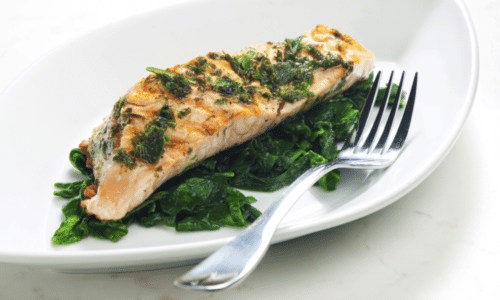From Candida to Hashimoto’s: 5 Diets Decoded for Modern Maladies and Pesky Symptoms
Home » Eat Empowered » From Candida to Hashimoto’s: 5 Diets Decoded for Modern Maladies and Pesky Symptoms
If one of your New Year’s goals is to find an eating plan that makes you feel stronger, gives you more energy, helps you with a weight loss goal, or eases digestive concerns, look no further.
Our Diets Decoded series takes a look at many of today’s popular healthy diets—from paleo to Mediterranean and vegetarian—and breaks them down for you. We explain the facts about each one and then provide quick, actionable tips on how to follow each diet as part of a Nutritious Life if it is appropriate for you.
“For each individual, the healthiest diet is an approach to eating that fuels your body and mind and fits into your lifestyle,” says Nutritious Life founder Keri Glassman, MS, RD, CDN. “Eating empowered, one of the eight pillars of a Nutritious Life, means listening to your body and focusing on the diverse, delicious, healthy foods you can have rather than what a hard-to-follow diet says you can’t have.”
In this roundup, we review five eating plans geared toward alleviating the symptoms of many of today’s chronic illnesses—from Hashimoto’s thyroiditis to other autoimmune and blood sugar imbalances.
Read on for a rundown on five of today’s most popular diets, which claim to relieve inflammation, heal your gut, or bring balance to your mind, body and spirit.
RELATED: From Paleo to Whole30: What a Celebrity RD thinks of Today’s Most Popular Diets
5 Diets for Alleviating Chronic Illness and Pesky Symptoms
-
The Elimination Diet

The Elimination Diet is a popular tool used by health professionals like registered dietitians and functional medicine physicians to help people identify foods that may be causing issues such as lack of energy, bloating or acne. As the name suggests, it’s done through a process of elimination.
Read on for the details, including what you eat and don’t eat, and the pros and cons of this diagnostic tool.
-
The Gundry Diet

You may have seen Dr Steven Gundry, MD, on an infomercial touting his treatment for things like leaky gut or telling you what three healthy foods you should avoid right now. The founder of Gundry MD is a former cardiothoracic surgeon who left that career path in 2002 to start his own wellness clinic, The Center for Restorative Medicine in Palm Springs, Calif. In his new incarnation, he claims to teach people how to avoid surgery by using his “unique vision of human nutrition.”
This “unique vision” is the Gundry Diet, an approach to eating that Dr. Gundry claims he’s used to successfully treat “tens of thousands of patients suffering from autoimmune disorders, diabetes, leaky gut syndrome, heart disease, and neurodegenerative diseases.” The diet is focused on one major principle: avoiding lectins, which are found in a variety of foods and can increase inflammation and impact your gut in negative ways, according to Dr. Gundry.
Read on for the details and whether this diet stands up to its claims.
-
The Candida Diet

Candida is a fungus that’s usually harmless. It’s a type of yeast that lives in your body and even helps your gut with digestion.
But when it comes to candida, the more is definitely not the merrier. “Yeast can hang out and patiently wait for the environment to become more hospitable so it can multiply and thrive,” says Dr. Anna Cabeca, DO, a triple board-certified osteopathic physician.
That’s when it becomes a fungal infection called candidiasis, which is no fun. The Candida Diet was developed in order to starve the candida and prevent it from spreading.
If you’re struggling with candida overgrowth, find out if the pros and cons of this diet might be right for you.
-
Hashimoto’s Diet

Hashimoto’s is an autoimmune disease that leads to damage and inflammation of your thyroid, a small but mighty gland that sits at the base of your neck and secretes important thyroid hormones. These hormones regulate energy metabolism, which means they affect nearly every organ and play a large role in your weight, heart rate, digestion, nervous system and more.
Symptoms of Hashimoto’s hypothyroidism can include fatigue, unexplained weight gain, heavy or irregular menstrual periods, hair loss, dry skin, constipation, muscle aches, joint pain and depression.
The Hashimoto’s Diet aims to reduce inflammation, alleviate symptoms, and reduce the risk of conditions that are often linked to Hashimoto’s, such as other autoimmune diseases, high cholesterol, obesity and diabetes.
Want to put the kibosh on your hypothyroidism? Read on to find out if this diet might do the trick.
-
The Alkaline Diet

The pH levels in our bodies, also called the acid-base balance, can impact our health. The human body relies on a healthy balance of acidity and alkalinity to function properly. If this balance is disrupted, it can lead to acidosis (too acidic) or alkalosis (too alkaline), both of which cause their own set of problems.
The Alkaline Diet centers on the hypothesis that the foods we eat influence the pH of our bodies and thereby affect our health. It aims to help you strike the right balance, depending on your specific pH level and health concerns.
Find out if the Alkaline Diet’s claims are true and whether the foods we eat can actually alter our body’s pH. Read on for more details.
(Images: Shutterstock)
The Nutritious Life Editors are a team of healthy lifestyle enthusiasts who not only subscribe to — and live! — the 8 Pillars of a Nutritious Life, but also have access to some of the savviest thought leaders in the health and wellness space — including our founder and resident dietitian, Keri Glassman. From the hottest trends in wellness to the latest medical science, we stay on top of it all in order to deliver the info YOU need to live your most nutritious life.
RECENT ARTICLES

Want a sneak peek inside the program?
Get FREE access to some of the core training materials that make up our signature program – Become a Nutrition Coach.
Get Access"*" indicates required fields
 Eat Empowered
Eat Empowered












































































































































































































































































































































































































































































































































































































































































































































































































































































































































































































































































































































































































































































































































































































































